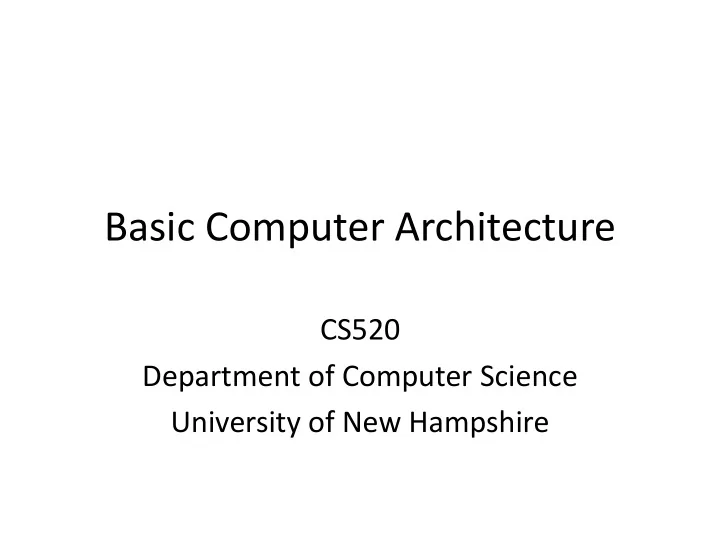

Basic Computer Architecture CS520 Department of Computer Science University of New Hampshire
CPU Bus Memory
CPU • Central Processing Unit • Contains: – Control Unit: decides what to do – Arithmetic/Logic Unit (ALU): does things – Registers: holds values
Memory • Stores instructions and data • Array of cells • The index of a cell is its address . • Two concepts: – address of cell – contents of cell
address Memory 0 1 The memory cell with address 7 has contents 1066. 2 3 4 5 6 7 1066 10 8 9
Contents of Memory • Just bits. • There is no tag indicating what kind of value (e.g. integer, floating-point, instruction, etc.) is in a cell.
Example Instruction • Add contents of memory cell 10117 to register 6, interpreting the two operands as integer values. • Note: the instruction must supply the interpretation of the bits being manipulated! • This allows us to do tricky things, like store an integer into memory and then interpret it later as an instruction.
Fetch/Execute Cycle • Fetch 1. Determine address of next instruction. 2. Fetch the next instruction. 3. Decode the next instruction. 4. Fetch operands. • Execute 5. Execute instruction. 6. Store results. 7. Go to 1.
Program Counter • There is a dedicated register that tracks the address of the memory cell that contains the next instruction to be executed. • The generic name for this register is the program counter (PC). • On the Intel IA-32 architecture, for example, the program counter is called the eip register ( e xtended i nstruction p ointer).
Von Neumann Machine • The stored-program design is attributed to the mathematician John Von Neumann*, so the design is also known as a Von Neumann machine. • Storing the program in memory enables: – Compilers and linkers – Self-modifying programs – Just-in-time translation • e.g. Java bytecode to Intel machine code * This attribution is controversial.
Von Neumann Bottleneck Central Processing Unit Bus bottleneck Memory • All data and instructions must pass via the bus. • Memory is much slower than CPU.
Recommend
More recommend